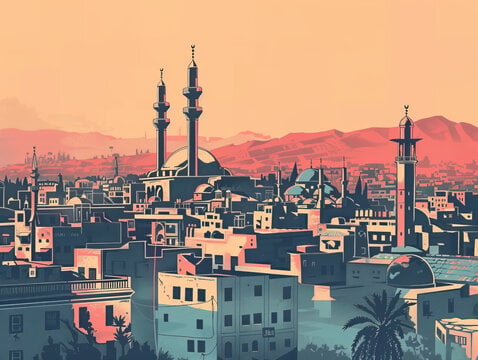What Do Family Names in Damascus Reveal About Their History?
Family names are passed down through generations, so it makes sense that a family name can reveal much about its history. Every family in Damascus has a story tied to its name! If you’re curious about where these names originated or want to learn more about your own family history, then read on.

Where do well-known family names come from?
Damascene family names are often derived from professions, places, or certain traits. For example, some families were named after textile-related trades, like the Hayek (weaver), Sabbagh (dyer), and Sawaf (wool carder) families. Those who worked in shoe-making got the names Jazmati (cobbler), Skafi (shoemaker), and Qabakebi (traditional wooden clog maker). There are families whose names have associations with weights, like Qabbani (related to scales) and Kayyal (weigher), or with cooking, such as Tabbakh (cook).
Some family names associate with food-related trades, like Khodari (greengrocer), Saman (grocer), and Fakahani (fruit seller). Others worked in grocery, cheese, and molasses trade, and their names reflected these products. Families that work in construction and architecture have names like Muammar Bashi (chief builder), Tayan (plasterer), and Haffar (digger).
Food, professions, and even music?
Damascenes also have families named after café-related jobs, such as Qahwaji (coffee maker) and Hakawati (storyteller). Families who worked with beans and chickpeas were Fawwal (bean seller) and Hummsani (hummus seller), while those associated with clothing had names like Khayyat (tailor) and Tarzi (embroiderer). Those who took care of bees were Nahlawi (beekeeper) and Asali (honey maker), and those in education were known as Mudarris (teacher) and Muallim (instructor). Families who guarded homes and places were Bawwab (doorman) and Haris (guard).
As for those who dealt with gold, they were as ‘el-Sayigh’ and ‘el-Jawharji’. Those who worked in blacksmithing were called ‘el-Haddad’ and ‘el-Bawabiri’.
In Damascus, some families were also named after musical instruments, such as Wattar (lute string maker) and Awad (lute player). Those in the sweets business have names like Ka’ikati (cookie maker), Halwani (confectioner), and Baghajati (pastry maker), while those working in bakeries have names like Khabbaz and Farran (baker).
Some families were named after body parts. Others were named based on their skin color, such as Asmar (brown), Aswad (black), and Abyad (white). There are also families with names derived from sounds or characteristics, like Sheikh Al Shabab.
Because Damascus is a city open to immigrants, there are families named after cities or countries they came from. We are talking about names as Al-Homsi, Al-Halabi, Al-Ladkani, Al-Beiruti, and Al-Baghdadi. There are also those who were named after areas within Damascus itself, like Al-Shaghouri and Al-Maidani. How cool is that?
If you enjoyed this read, you might also like: Who is “The Golden Man” in Damascus?